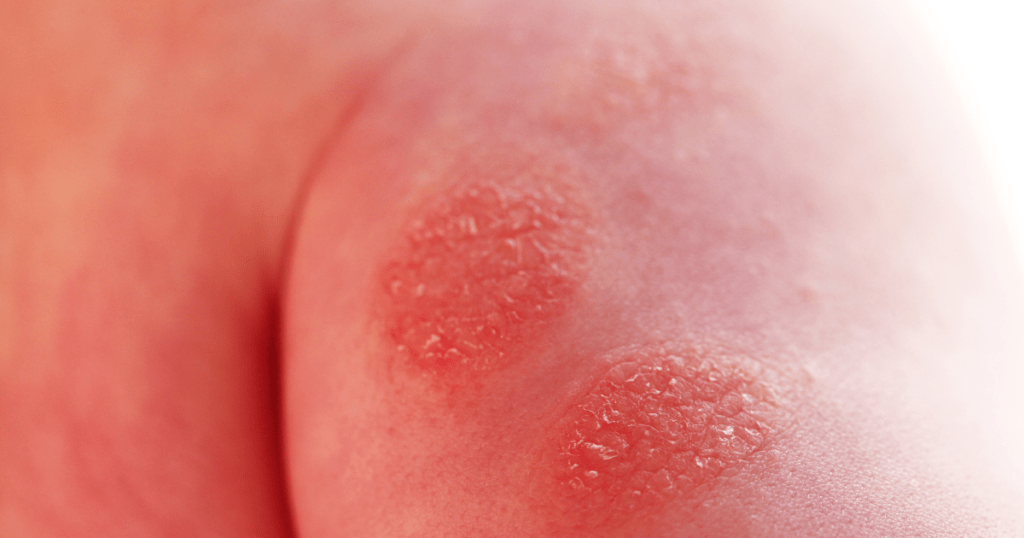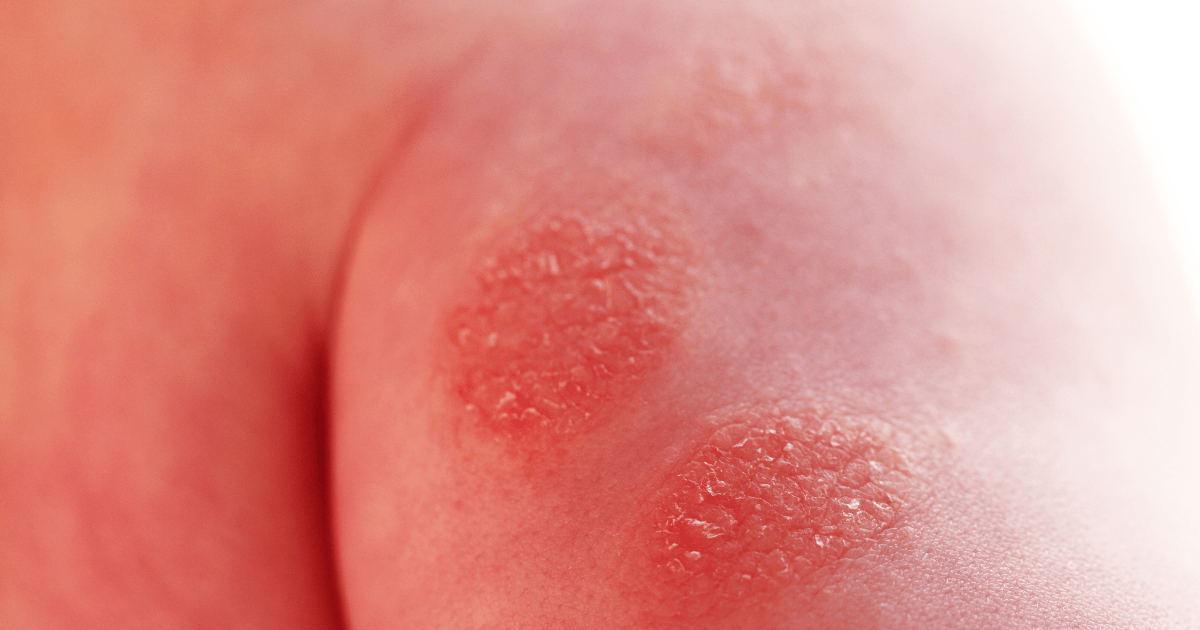Nummular Eczema: Causes, Symptoms, and Triggers
What is Nummular Eczema?
Nummular or discoid eczema is a chronic skin condition that causes round or oval-shaped patches of dry, itchy, and inflamed skin. These patches can range in size from a few millimeters to several centimeters and can appear anywhere on the body, although usually, they occur on the limbs and trunk.
The medical community does not know the exact cause of discoid eczema, but they believe it results from a combination of genetic, environmental, and immunological factors.The condition is more common in adults, and various factors, including stress, dry skin, irritants, and allergens can trigger it.
Symptoms of discoid eczema can include red, scaly, inflamed skin, itching, and flaking. The affected areas may also become crusty, blistered, or infected with bacteria, which can cause oozing and crusting. Discoid eczema can sometimes be accompanied by a burning or stinging sensation.

Treatment for discoid eczema typically involves a combination of topical medications and lifestyle changes. Topical corticosteroids are often prescribed to reduce inflammation and itching, while emollients moisturize and protect the skin.
While discoid eczema can be a chronic and frustrating condition, most people can control their symptoms and maintain good skin health with proper treatment and management. If you are experiencing symptoms of discoid eczema, it is essential to speak with your healthcare provider to determine the best treatment for your needs.
In addition to medication, several self-care measures can help to manage discoid eczema. These include avoiding triggers such as harsh soaps or detergents, moisturizing skin, and wearing loose-fitting clothing from soft, breathable fabrics. It is also essential to avoid scratching or picking at the affected skin, which can lead to further irritation and infection.
How to differentiate between ringworm and nummular eczema?
Ringworm and nummular eczema are the same in appearance in the form of circular patches. However, both have different causes and require different treatment.
Ringworm is caused by fungus and is contagious. Nummular dermatitis, conversely, is a form of eczema and is not infectious. Also, nummular eczema causes several ring patches, while ringworm appears as one or two ring-like patches on the body.
What are the causes of nummular eczema?
The causes of nummular eczema are not known, but several factors may trigger nummular dermatitis, such as:
- Dehydrated skin or dry environment
- Bacterial infection
- Some of the soaps with irritating substances
- Taking a shower or bath with hot water
- Skin contact with rough fabrics such as wool
- Allergies
Nummular eczema is rare among children. Usually, it is prevalent among men in the age group of 50 to 70 and women in their twenties.
Does stress cause nummular eczema?
According to the findings of some of the research, stress can be a cause of nummular eczema flare-ups. However, stress doesn’t believe in causing nummular eczema.
What are the symptoms of nummular dermatitis?
The initial sign of nummular eczema is in the form of bumps or blisters. They usually appear on the hands, arms, legs, or torso. They may be crusty on the upper surface with clear fluid discharge. The spots are also quite itchy.
Depending on a person’s skin pigmentation, the lesions may be brown, pink, or red.
How is nummular dermatitis diagnosed?
Diagnosis of nummular eczema typically involves a physical examination and a review of the patient’s medical history. A doctor may also perform a skin biopsy to rule out other conditions, such as psoriasis or fungal infections. Medical practitioners, particularly dermatologists, should be consulted to determine the type of skin disorder.
How is nummular eczema treated?
There is no cure for nummular eczema. Over-the-counter medications may not be effective. It is better to consult a healthcare professional for prescription medications. Nummular eczema requires a long-term treatment to relieve the symptoms, which include:
- To keep the skin moist by using moisturizers
- Antihistamines to relieve itching
- Topical corticosteroids ointments
- Oral corticosteroids – to control severe flare-ups
- Choosing mild soap or substituting soap with milder alternative products
How to prevent the recurrence of nummular eczema?
To reduce the risk of recurrence of nummular eczema, one can adopt strategies such as:
- Choosing skin products and detergents that have no fragrance.
- Avoid irritating fabrics.
- Taking showers with lukewarm water.
- Using gentle cleansers that contain moisturizers.
- Keeping the skin moist by using moisturizers when the skin is still damp after a shower or bath.
- Avoid hot water baths for a longer duration.
- Managing stress which is known to cause flare-ups of eczema.
Sources:
Cleveland Clinic. Nummular eczema. (https://my.clevelandclinic.org/health/diseases/22757-nummular-eczema). Accessed May 1, 2023
Healthline. Nummular eczema. (https://www.healthline.com/health/skin/nummular-eczema#difference-from-ringworm). Accessed May 2, 2023
NHS Inform. Discoid eczema. (https://www.nhsinform.scot/illnesses-and-conditions/skin-hair-and-nails/discoid-eczema). Accessed May 3, 2023
Category
- Health Issues (72)
- Healthy Diet (48)
- Herbs for Health (11)
- Mental Health (33)
- Skin Care (20)

